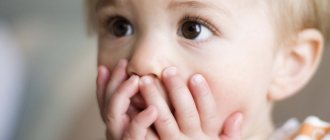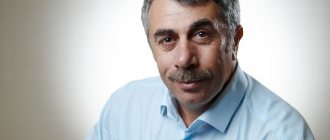Why does a 2-year-old child not speak and how to help him?
18.02.2020
Every mother wants her baby to develop correctly, reaching all the required standards in a timely manner. One of the problems that young parents face is the lack of speech in a child at the age of two. But before you give in to panic, you need to understand the reasons for the baby’s silence and try to help him as much as possible.
How should speech develop at different age stages?
Normally, a growing child’s speech should go through the following stages:
1) lasts from the birth of the child to one year. It is called "preparatory". At this stage, experts distinguish three more periods:
- The baby’s very first interaction with the outside world is his screaming and crying. To express joy, the baby squeals, to express dissatisfaction, he whines. This period lasts from birth to three months;
- from three to six months, the child goes through a period of speech called “humming,” that is, prolonged pronunciation of sounds ;
- the next period is “babbling,” when the baby begins to repeat certain syllables. Normally, it ends by about a year. Ideally, a child should pronounce from 5 to 9 words;
2) the second stage occurs from one to three years of the child. It's called "preparatory". While developing his vocabulary, the baby tries to pronounce words in full, and not just individual syllables. At one and a half years old, a child should normally already know 20-40 words. By the age of two, begin to construct simple sentences. And by three - sentences become complex, questions are used in speech , as well as almost all parts of speech ;
3) the third stage lasts until the child reaches the age of seven years. By the end of it, children are constructing sentences correctly using all sounds .
But, unfortunately, this is not always the case. Why does this happen, and what could be the reasons for the lag behind the norm?
Possible causes of speech delay
Most likely, the reasons for the delay are neurological in nature. Doctors note that this could be damage to the brain , hypoxia during pregnancy , bad habits of the mother, birth injuries, childbirth earlier or later than expected.
Physiological reasons for delay include the baby’s hearing ; the speech apparatus may also be underdeveloped. In addition, autism and mental retardation may be causes.
It is important to pay attention to whether the baby understands the speech of adults, how he reacts to requests to bring some thing. Often, at 2 years old, a child understands everything, but does not speak.
How should parents behave in this case?
If the reason for the child’s “silence” is organic, you should consult a doctor who will make an accurate diagnosis and prescribe appropriate treatment. But when the problem is psychological or social, parents need to create the most favorable conditions for the development speech .
It is recommended to use special speech therapy exercises and techniques that can be easily found on the Internet or in special books. It is also advisable to talk to the child as much as possible so that he can see the articulation. It is useful to sing songs, read books, and develop fine motor skills .
The most important thing when developing speech is to come up with situations in which the baby will be “forced” to speak: these could be alternative questions or a request to ask something from other family members. The main thing is to communicate as much as possible, then by school speech will definitely catch up with his peers.
Published in Defectology Premium Clinic
Causes of speech regression
At different stages of development, the baby may stop making sounds, words, cooing or babbling. Various factors influence this. If a baby stops speaking at one year old, this is not always a cause for concern. The reason may lie in a change in situation. Therefore, if the child has stopped speaking, then medical intervention may not be required. Classes with a teacher and speech therapist will be enough.
There are three groups of reasons why a child may stop talking:
- Psychological. Parents often notice that the child knew a lot of words, and then stopped talking completely. This may happen due to:
- due to severe stress, such as the loss of a parent;
- children also speak and then become silent due to quarrels in the family, emotional turmoil due to accidents and other negative situations;
- after a fright. Often such a minor event as sudden braking of a car or loud noises lead to the fact that the baby stops speaking completely. In these cases, the help of a psychologist and speech therapist is required.
- strong parental pressure. Many mothers and fathers want to speed up their baby’s speech development. However, excessive loads can have the opposite effect. A developed child may become completely silent within a year after speaking absolutely normally;
- change of scenery. If the baby stops speaking when moving to a new kindergarten, then the problem lies in stress. It will be solved by a psychologist or a competent teacher.
- Physiological. Aphasia is a partial or complete breakdown of speech that has begun to form. It manifests itself when the speech parts of the brain or pathways are damaged. Your baby may talk and then stop because:
- ischemic or hemorrhagic stroke;
- traumatic brain injury;
- inflammation of the brain (encephalitis, abscess, etc.);
- diseases of the central nervous system;
- brain tumors;
- mental illness;
- brain surgery.
If the child stops speaking words for no apparent reason, then it is necessary to exclude or confirm aphasia. To select an effective correction method, the type of pathology should be determined.
How can adults help the development of an 8-9 month old baby?
- pay attention to your child's reactions to new people and places;
- describe out loud the objects the child plays with (“This is a red round ball”);
- pronounce the emotions that the baby may be experiencing at the moment (“You’re upset now because your toy fell and got dirty, and you can’t play with it”);
- repeat out loud the sounds your child makes;
- be there when the child tries to crawl or stand up - he needs to feel the presence of mom or dad.
First phrases
An important stage in speech development is the acquisition of phrasal speech in preschool age. By the age of 1.5–2 years, simple two-word phrases usually appear in speech. The vocabulary is actively increasing, verbs, prepositions, and adverbs are being used. At 2-3 years old, children begin to use adjectives. The age of 3-5 years is often called the age of “why”. During this period, children are interested in everything, eagerly learn about the world around them and, accordingly, ask adults many questions.
If at this age the child does not have phrasal speech, you should consult a specialist. Developmental activities will help fill in the gaps and lay the foundation for the further development of your baby’s speech.
To develop your child’s phrasal speech, you can do the following:
- Read books to your child that are appropriate for his age;
- Look at the pictures;
- Listen to music with your child, sing songs, dance;
- Answer the child’s questions and support his research interest;
- Provide the child with new impressions, discuss what he sees;
- Monitor the purity of your own speech;
- Encourage communication with children.
There are also a number of games and exercises that contribute to the development of a child’s speech. These include:
- Games to develop fine motor skills;
- Articulation gymnastics;
- Finger gymnastics.
You can get acquainted with these and many other useful exercises in classes at. The good thing about these games is that you can play them at home yourself. They not only have a beneficial effect on speech development, but also develop the baby’s attention, memory, and thinking. Perform only those exercises that evoke positive emotions in you and your child, do it unobtrusively and with genuine interest. The most important thing is to enjoy communicating with each other.
Baby becomes silent in front of strangers
Silence is a natural defensive reaction of the body when a child encounters a stranger, especially if he seems scary or simply somehow incomprehensible. Lack of speech may occur for several hours after the meeting.
Solution: If your baby fell silent immediately after your meeting with a stranger, then most likely he will speak before going to bed. Be sure to have a friendly conversation with him about the stranger, tell him that he is a good person who poses no danger, and that his parents like to communicate with him. The child should feel that you are completely safe with him, and next time he will worry less.
Nutrition for boys and girls 8 months
As before, the basis of the baby’s diet remains breast milk or its substitute - an adapted milk formula. But besides this, more and more complementary foods appear in a child’s life. The essence of introducing complementary foods is familiarization with new tastes and textures, visualization of food (before this he had not seen the milk he ate), introducing the child to his family’s table and completely replacing milk or formula in the future. By this point, children are most often already familiar with vegetables, cereals and pureed meat. By 8-9 months, you can add boiled yolk and fermented milk products - cottage cheese or kefir - to the diet.
In addition, 8 months is the optimal age for introducing kibble complementary foods. You should start with small “cubes” no larger than 0.5 * 0.5 cm of soft consistency (for example, zucchini), so that the child can bite it with his gums if something happens. Do not forget that the introduction of “pieces” is an important stage in the baby’s development! Experts believe that if this is not done before 12 months, the chewing reflex will begin to fade.
Corrective work
Parents of a child who has a delay in speech development must understand that in order to solve the problem it is necessary to devote more time to him - read aloud, surround the baby with attention and care.
The situation in the family is the most important factor, which is often underestimated, and parents continue to go with the flow, expecting that the child will speak on his own.
In addition, it is necessary to work with a defectologist for children with delayed speech development (speech therapist); art therapy (dance, music, drawing, modeling classes), rhythmics, gymnastics, dolphin therapy, hippotherapy, and interaction with pets will not be superfluous.
Delayed speech development disappears on its own in a relatively small number of children, so when the first signs appear, parents should not wait and put off the problem, expecting it to be solved without their participation. If measures are not taken to correct speech development disorders, the child may develop more serious deviations.
Disease
In some cases, speech disappears if the infection has affected the organs of the respiratory system and caused an increase in body temperature. This happens especially often in very young children who are just starting to speak. In more severe situations, the infection affects the speech centers of the brain and auditory receptors.
Solution: As a rule, speech is restored to its previous volume after recovery from colds, so special help is not required. If the child has suffered a severe infection, he should be immediately checked by a neurologist and otolaryngologist. The sooner treatment and correction are started, the more speech will return to the baby.








